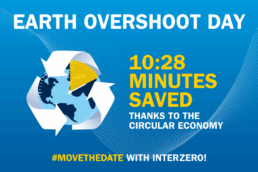Today is Earth Overshoot Day 2025. For us at Interzero, this day represents what inspires us like no other. This year, thanks to our circular solutions, we are once again postponing the EOD. We’re not achieving this alone, but together with our customers and partners – because: “Climate protection is a team sport.” But for an even greater impact, more is needed: better framework conditions for the circular economy and the close cooperation of politics, business, and society – a true team for resource conservation.
July 24, 2025, marks Earth Overshoot Day , the day on which humanity worldwide has consumed all the natural resources the earth can regenerate within a year. This year, we’ll reach this date earlier again. In 2025, the EOD was pushed forward by eight days. However, calculations by the Global Footprint Network based on the resources SAVED study by Fraunhofer UMSICHT demonstrate that the levers of the circular economy are taking effect: Together with customers and partners, Interzero is postponing Earth Overshoot Day by 10 minutes and 28 seconds – worldwide.
Although humanity is living beyond its means ecologically as of the end of July, Interzero impressively demonstrates that a functioning circular economy can have a positive impact on resource conservation and climate protection. Every recycled packaging, every refurbished electronic device, and every properly disposed battery reduces the demand for primary resources and are important steps toward our vision of a world without waste.
Mathis Wackernagel: “In recent years, we have refined our estimates of the extent to which Interzero’s products and services reduce global ecological overshoot. Our latest calculations confirm that the company, together with its customers, was able to postpone Earth Overshoot Day by a few minutes. This means that Interzero is truly circular: the larger its activities, the lower the global overshoot.”
Plastics as a key resource
At Interzero, a particularly significant lever for postponing Earth Overshoot Day lies in the area of plastics. Over 50 percent of the primary raw materials saved come from the recycling of plastic packaging, especially from the lightweight packaging (LVP) segment. As part of the dual system, the return and recycling of LVP contributes significantly to resource conservation – not only in terms of quantity, but also through the particularly high savings potential.
Improved and uniform rules of the game
But the potential is far from exhausted. In addition to individual consumer decisions and better waste separation, what is needed, first and foremost, is structurally improved framework conditions and targeted innovation support to effectively leverage the circular economy. There are numerous starting points: the expansion of separate collection, the early introduction of new EPR systems, the consistent implementation of sustainable public procurement, and the prioritization of recyclable packaging. A deposit return system for rechargeable batteries and batteries can also contribute to increasing safety in the industry. A clear political framework is needed that promotes technological innovations and secures investments in the circular economy.
Sybilla Merian: “The ideas are there – powerful, effective, and forward-looking. It’s committed people, bold projects, and innovative technologies that are already making the circular economy a true game changer. But to permanently embed the change, more is needed: We must rewrite the rules of the game – boldly, together, and with an eye on a future worth living.”
Earth Overshoot Day makes it clear: We’re living far beyond our means. But we can counteract this – with a team committed to a functioning circular economy.
Let’s #MoveTheDate. With Interzero.
About the calculation:
For its calculations, the Global Footprint Network uses a resource accounting system: the “ecological footprint.” Using this indicator, the non-profit organization compares the current needs of the world’s population (or countries) with the Earth’s capacity to renew the natural resources it consumes. Valid baseline data for Interzero’s contribution to the reduction of carbon footprint is provided, among other sources, by the “resources SAVED by Recycling” study by the Fraunhofer Institute for Environmental, Safety, and Energy Technology UMSICHT. On behalf of Interzero, the scientists determine annually how many greenhouse gases and resources are saved by recycling recyclable materials.
About Interzero:
Interzero is one of the leading service providers for closing product, material and logistics cycles and an innovation leader in plastics recycling with the largest sorting capacity in Europe. Under the guiding principle of “zero waste solutions”, the company supports over 50,000 customers across Europe in the responsible handling of recyclable materials, helping them to improve their own sustainability performance and conserve primary resources. With around 2,000 employees, the company generates sales of over one billion euros (2021). According to Fraunhofer UMSICHT, Interzero’s recycling activities saved 1.2 million tons of greenhouse gases and 11.1 million tons of primary raw materials compared to primary production in 2023 alone. As a pioneer of the circular economy, Interzero is the winner of the German Sustainability Award 2024 and the associated special prize in the transformation field of “resources”. Further information can be found at www.interzero.at .
Find out more in our current brochure on ” resources SAVED by recycling “

